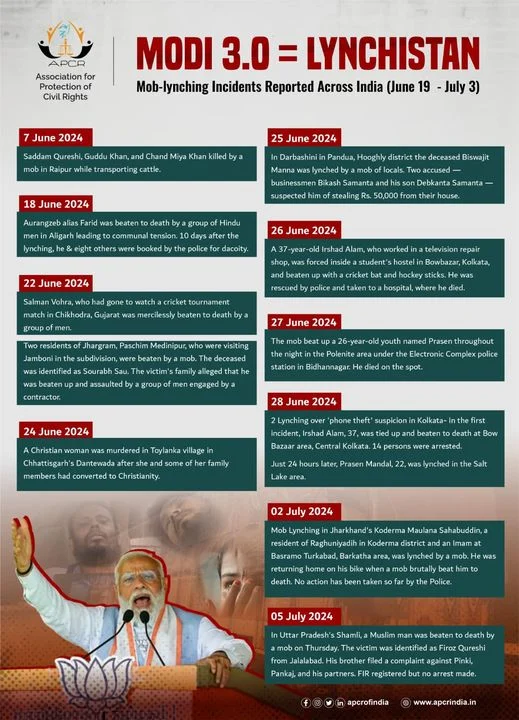News Prism, Delhi Desk
NEW DELHI: In the aftermath of India’s recent national election results, disturbing surge of communal violence, hate attacks and lynching incidents have shaken the country, raising serious concerns about the safety of religious minorities and the escalation of divisive politics.
The indiatomorrow.net covers an extensive report and gave details from civil rights groups and eyewitnesses which painted a grim picture of targeted attacks, lynching incidents, and the demolition of homes, predominantly affecting Muslim communities across several states.
Since the announcement of the election outcome on June 4th, incidents of violence have been on the rise, with human rights activists attributing these acts to emboldened extremist elements following the electoral victory of Prime Minister Narendra Modi’s Bharatiya Janata Party (BJP). Despite a narrower parliamentary majority, fears persist that hardline Hindutva factions may exploit the political climate to fuel communal tensions.
The Association for Protection of Civil Rights (APCR), a prominent civil liberties body, has meticulously documented numerous cases of brutal attacks within the span of just one month post-election. These incidents include lynching, communal riots, and the targeted destruction of Muslim-owned properties, allegedly orchestrated by self-proclaimed “cow vigilante” groups.
In one of the most horrifying incidents, three Muslim men in Uttar Pradesh were mercilessly attacked and fatally beaten by a Hindu mob in Raipur, Chhattisgarh, on June 7th. The victims—Saddam Qureshi, Chand Miya Khan, and Guddu Khan—were accused of cow smuggling while transporting cattle, a charge that led to their tragic deaths. Similarly, in Aligarh, Uttar Pradesh, on June 18th, Aurangzeb alias Farid was lynched by a group of Hindu men, sparking communal tensions in the region.
The violence has not been confined to accusations of cow-related offenses. In Gujarat’s Anand district, Salman Vohra, a young Muslim man, was brutally beaten to death by a mob following a cricket tournament where tensions reportedly flared due to the success of Muslim players. This incident underscores the broader pattern of communal violence fuelled by religious and cultural friction.
In West Bengal, several incidents of lynching have been reported, including the fatal assault on Irshad Alam, a TV repair shop worker, in Kolkata, and Prasen Mandal in Salt Lake. These attacks highlight the vulnerability of individuals targeted due to their religious identity.
The brutality extends beyond individuals to religious leaders as well. In separate incidents across India, three Muslim clerics have been brutally killed. Maulana Farooq in Pratapgarh, Uttar Pradesh, Maulana Akram in Moradabad District, and Maulana Shahabuddin in Jharkhand fell victim to targeted violence, raising alarms about the safety of religious minorities in the country.
In addition to targeted killings, communal tensions have erupted in various states, leading to clashes and mob violence. Telangana’s Medak district witnessed clashes over cow transportation, resulting in attacks on a madrasa and a local hospital. In Odisha, communal riots broke out in Balasore and Khordha, triggering curfews and property damage. Rajasthan’s Jodhpur faced unrest over religious flags, further exacerbating communal divisions.
Moreover, authorities have faced accusations of using housing demolitions as collective punishment against Muslim communities. Reports from Madhya Pradesh and Uttar Pradesh detail instances where homes were demolished under contentious circumstances, raising questions about the motivations behind these actions.
Critics have voiced sharp condemnation against the government’s handling of the situation, accusing authorities of failing to curb violence and protect vulnerable communities. Civil society groups have decried the silence of political leaders, including Prime Minister Modi, regarding the escalating violence and the plight of religious minorities.
Nadeem Khan, national secretary of the Association for Protection of Civil Rights, expressed disappointment over the lack of response from prominent opposition leaders and political parties. Asaduddin Owaisi, MP of the All India Majlis-e-Ittehadul Muslimeen (AIMIM), highlighted the alarming trend of anti-Muslim violence in Parliament, urging immediate action to address the crisis.
The Communist Party of India (Marxist) has also raised concerns about the BJP’s potential role in exacerbating communal tensions for political gain, warning against further polarization in the country.
The wave of violence has not only claimed lives and destroyed property but has also deepened societal divisions, posing a significant challenge to India’s secular fabric and its commitment to religious pluralism. The coming days are critical as India passes through this turbulent period, with the international community closely watching developments and urging authorities to uphold human rights and protect religious minorities from further harm.

